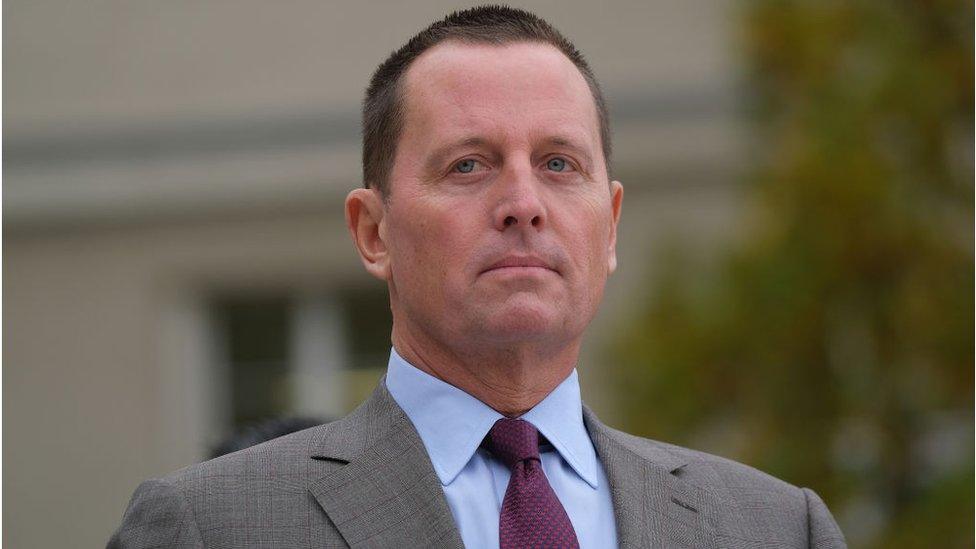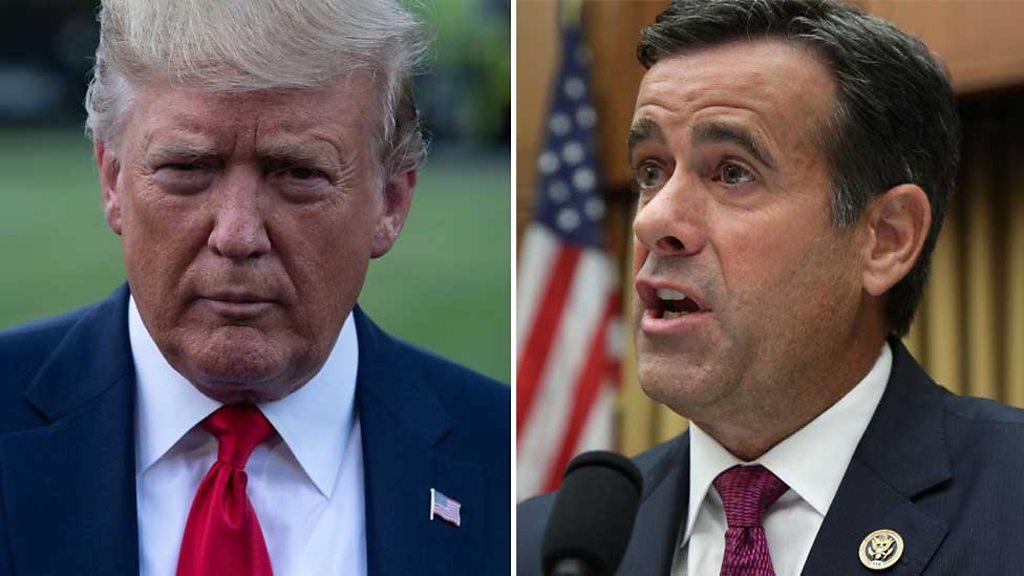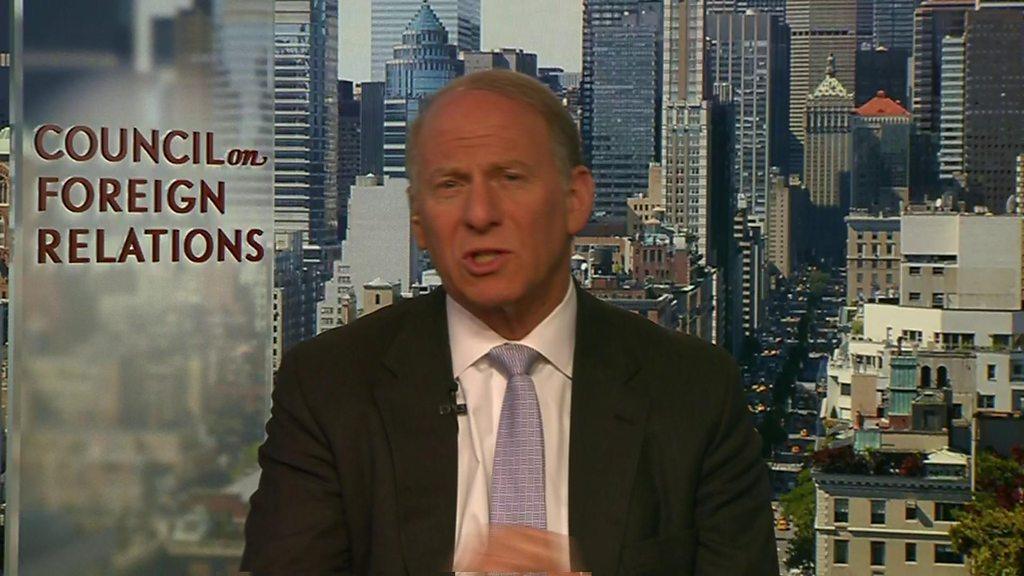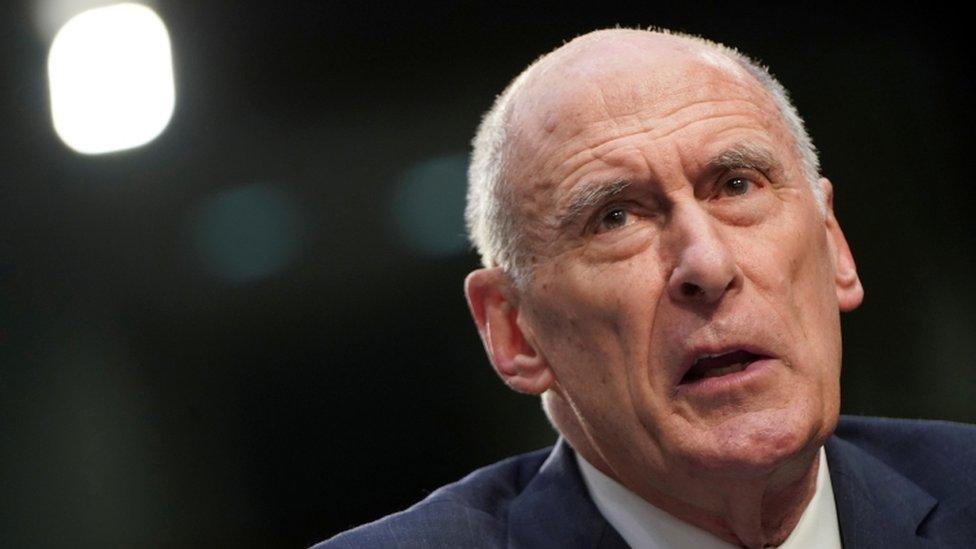Trump criticised for appointing loyalist Grenell as acting spy chief
- Published

Richard Grenell, the US ambassador to Germany, is a staunch Trump ally
President Donald Trump has appointed Richard Grenell, the current ambassador to Germany, as the acting intelligence chief in charge of US spy agencies.
The move was a surprise to many given his lack of relevant experience and controversial record of pushing conservative policies as a diplomat.
But Mr Grenell is a staunch Trump loyalist and has been outspoken in his defence of the president.
Critics say this bias will impede his ability to deliver neutral facts.
As the acting Director of National Intelligence, Mr Grenell will manage the National Security Agency, FBI, and CIA among other agencies, as well as advise the president on intelligence concerns.
The president announced the appointment via Twitter on Wednesday, saying Mr Grenell had "represented our Country exceedingly well" as ambassador.
Allow X content?
This article contains content provided by X. We ask for your permission before anything is loaded, as they may be using cookies and other technologies. You may want to read X’s cookie policy, external and privacy policy, external before accepting. To view this content choose ‘accept and continue’.

But US media report some officials and Trump allies are concerned that Mr Grenell was given the directorship based primarily on his loyalty to Mr Trump.
Mr Grenell is a former Fox News contributor and served as US spokesman at the United Nations during President George W Bush's term. He was confirmed by the Senate to the ambassador role in April 2018.
He is believed to be the first openly gay member of Mr Trump's cabinet.
Mr Grenell will replace the current acting director, Retired Vice Admiral Joseph Maguire, who must leave the post by 12 March in accordance with federal law.
When the last director, Dan Coats, left in July, the president attempted to fill the role with another loyalist, Republican congressman John Ratcliffe.
Mr Trump eventually decided against doing so after bipartisan pushback over Mr Ratcliffe's lack of experience and outspoken support for him. It was clear he was unlikely to be confirmed by the Senate.
There is no indication whether or not Mr Trump intends Mr Grenell to serve permanently.
A White House statement said Mr Grenell had "years of experience working with our Intelligence Community in a number of additional positions" and would take a "non-political, non-partisan approach".
However, some in Washington were less convinced.
"This is a job requiring leadership, management, substance and secrecy," former CIA officer John Sipher told the New York Times, external.
"He doesn't have the kind of background and experience we would expect for such a critical position."

Who else has served in the role?
The idea of having a Director of National Intelligence had been floated since the 1950s, but the role was not created until the aftermath of 9/11.
John Negroponte was the first director in 2005. He was a career foreign service member, including serving as ambassador to the United Nations and Iraq, and was President Ronald Reagan's deputy national security adviser
Mike McConnell was a retired vice admiral and longtime intelligence professional, who was director of the National Security Agency before his appointment to the spy chief role in 2007
Dennis Blair was a retired four-star admiral, former head of US Pacific Command and former Joint Staff director at the Pentagon; he also served as the associate central military intelligence director under President Bill Clinton
James Clapper was a Lt Gen in the US Air Force and director of the defence intelligence agency; he served in intelligence following 9/11 and had received an honorary doctorate from the Joint Military Intelligence College. He resigned as Director of National Intelligence when President Barack Obama left office
Dan Coats, who left the post in 2019, was an Army veteran, the former US Senator from Indiana and ambassador to Germany

Mr Trump has feuded with the intelligence community throughout his presidency, questioning reports by US agencies that Russia interfered in the 2016 election.
Last year, Mr Trump told his own intelligence chiefs to "go back to school", assailing them for being "extremely passive and naive" over Iran.
'The head of US intelligence has to be non-partisan', warns former CIA operative.
Mr Grenell has also been dismissive about Russian meddling and, in his post as ambassador, been an outspoken critic of Berlin's policies. He has called for Germany to follow through on Mr Trump's demands, like increasing contributions to Nato and ending business operations in Iran.
In 2018, following his move to Berlin, Mr Grenell told the far-right publication Breitbart, external: "I absolutely want to empower other conservatives throughout Europe, other leaders. I think there is a groundswell of conservative policies that are taking hold because of the failed policies of the left."
Last year, he spearheaded a campaign to end the criminalisation of homosexuality worldwide.
He is expected to retain his ambassadorship while serving as acting intelligence chief.
- Published29 July 2019

- Published11 January 2017

- Published29 July 2019
